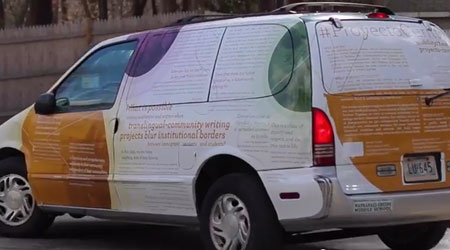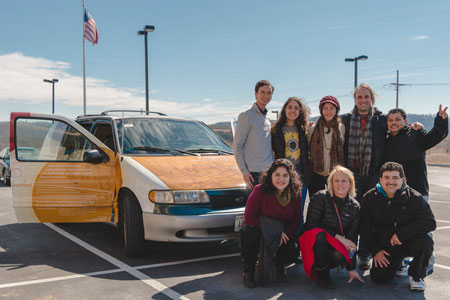Van, art drive home immigration messages
Students are literally driving home their experiences about immigration with a creative new project in the Department of Writing, Literature and Publishing.
Since the beginning of this semester, students in lecturer Tamera Marko’s translingual writing class, which includes non-native English-speaking Emerson maintenance workers, have artistically wrapped a minivan—owned by one of the maintenance workers, Ramiro Soto—with personal stories about immigration.

Now they’re driving it across the country, sharing their stories at academic conferences.
“We literally wanted to drive our own narrative,” Marko said.
The goal of the project, Proyecto Carrito, is to dispel negative stereotypes and create inclusive social environments.
“I don’t know what I was thinking,” Soto said, jokingly. “But I got the chance to get another car for very cheap. So [my wife and I] donated one car and got another.”
Ryan Catalani ’15, a Visual and Media Arts major, worked as design director and created the text wrapping for the car. We Wrap Boston placed the wrapping on the vehicle.
The Proyecto Carrito students curated their car-text from 500 written-word pages, photographs, and videos they have produced together over the past three years, according to the group’s website. The car-text publishes their evolving identities as writers in the context of U.S. immigration policy.
“So many of our stories are about crossing or being blocked by borders,” the group website said. “Together, we write to overcome obstructions to our college workers’ rhetorical mobility.”
The participants have driven from Boston to Indianapolis, San Antonio, and Durham, North Carolina, for academic conferences to share their artwork and messages about immigration.

Lecturer Tamera Marko (bottom, center) with Proyecto Carrito participants at a rest stop in Pennsylvania in March. (Photo from Proyecto Carrito Blog)
The translingual writing class encourages students to write in their native languages in addition to English. It is open to staff members who are interested in learning English, including Emerson’s predominantly Spanish-speaking maintenance staff.
Mario Osorio, a maintenance worker student who emigrated from El Salvador, read his story at the conference in Indianapolis. He wanted to clear up misconceptions about immigration.
Through an interpreter, Bianca Padro Ocasio ’16, Osorio said, “I believe that this anti-immigrant sentiment is because of the information that we’re listening to [in the media]. It’s mostly not true.”
Osorio has been working in the Facilities Management Department at Emerson for 13 years. He said he came to the United States for the job opportunities to support his family in El Salvador.
“The class is really important to me because of the relationship that we now have with the students,” he said. “It makes you feel like you’re being treated with respect and dignity and that people appreciate the work that you do here.”
Marko said inclusiveness here at Emerson could be as simple as saying good morning to someone in the elevator. She said her experience growing up near the Mexico border in California, and having many immigrant friends who lived in fear of deportation, has driven her to empower her students.
“The fact that Emerson College allowed this class to happen…is extraordinary,” she said. “And I think it is especially extraordinary because what we are doing is true community building.”
Categories